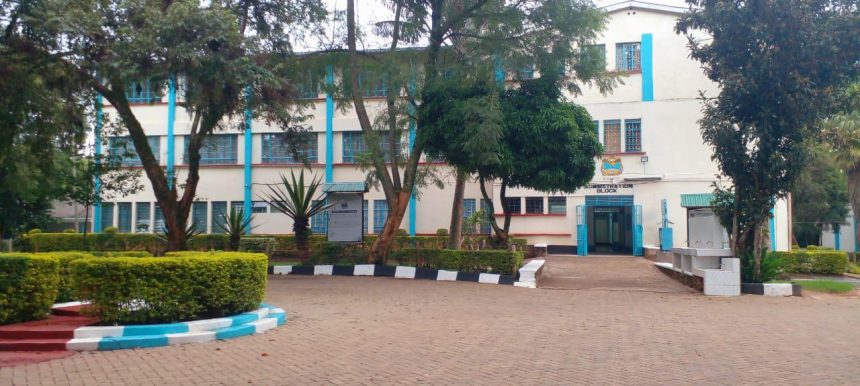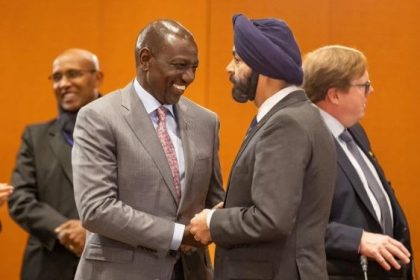A significant controversy is unfolding at Kaimosi Friends National Polytechnic as serious allegations have emerged against Chief Principal Dr. J.W. Okumu Odhiambo, suggesting his involvement in a troubling pattern of sexual harassment aimed at female lecturers.
These claims, brought to light by several insiders within the institution, reveal a disturbing environment characterized by the misuse of power, professional undermining, and a pervasive culture of silence that has reportedly thrived during Dr. Okumu’s tenure.
As the veil of silence begins to lift, there is a growing chorus of voices demanding justice, with an increasing number of faculty members and concerned community members calling for transparency, accountability, and a thorough investigation into these allegations.
Claims of Sexual Harassment Shake Kaimosi Friends National Polytechnic
Multiple credible sources inside Kaimosi Friends National Polytechnic say that Dr. Okumu has for a while used his senior position to make unwanted sexual advances toward female staff. These alleged acts have reportedly taken place over several months, possibly years, leaving behind a trail of intimidation, fear, and psychological trauma.
Those who have reportedly stood their ground and rejected the principal’s advances say they have paid a steep price. Sources claim some female lecturers were suddenly transferred, others faced interdictions, while others had their duties silently withdrawn without any explanation. The goal, they say, is to break their professional spirits and isolate them.
One affected lecturer, speaking on condition of anonymity, said, “He made it clear that my promotion would only come if I played along. When I refused, I was posted to a remote campus with zero consu ltation.”
Such revelations are not only shocking but also point to a system where sexual coercion is allegedly being weaponized in exchange for professional favors—a direct violation of employment laws, ethics, and basic human dignity.
Even more disturbing is the environment of fear that allegedly grips the institution. Many affected lecturers say they are too afraid to speak openly, fearing victimization or the end of their careers. This has made the problem harder to expose and address.
Principal Denies Allegations as Pressure Mounts
When contacted, Dr. Okumu denied any knowledge of the accusations. He said no formal complaints had been raised at the institution. “At the Polytechnic, we are not aware of such allegations,” he revealed, adding that inquiries should be directed to the State Department’s HR Directorate at Jogoo House.
But his response has done little to quell public outrage. According to insiders, a silent protest is being planned by affected lecturers and their allies, aimed at demanding immediate intervention from the Ministry of Education and other oversight bodies. Organizers hope to spark national attention and force a full probe into the matter.
There are also quiet efforts to involve the Ethics and Anti-Corruption Commission (EACC), Directorate of Criminal Investigations (DCI), and other arms of government in an independent investigation. Staff and stakeholders say this is the only way the truth will come out, as internal reporting mechanisms have allegedly failed to protect whistleblowers.
The scandal comes at a time when Kenya’s education sector is under scrutiny over rising reports of harassment, poor governance, and abuse of office in public institutions.
Push for Justice and Reforms at Kaimosi Friends National Polytechnic
The rising anger among staff at Kaimosi Friends National Polytechnic is not just about personal violations—it’s about a broken system. The scandal has exposed an urgent need for reforms in how complaints of sexual misconduct are handled in public colleges.
Many feel that the current framework is skewed in favor of powerful administrators. Even when complaints are raised, they often disappear into bureaucratic black holes. Victims are left hanging, while accused individuals continue to hold office.
Civil society groups and education watchdogs are now being urged to step in and amplify the voices of victims. The National Gender and Equality Commission (NGEC), Federation of Women Lawyers (FIDA), and Kenya National Commission on Human Rights (KNCHR) have been particularly mentioned as bodies that must take up the case.
A legal expert from Nairobi commented, “This is a textbook example of institutional failure. If these allegations are true, then the ministry must act now. No woman should be forced to choose between her dignity and her job.”
Meanwhile, students and parents are closely watching the unfolding saga. Many say the scandal has cast a dark shadow over the school’s reputation.
Kaimosi Friends National Polytechnic has long been respected in Western Kenya for its technical training programs. But unless action is taken, that legacy could soon be replaced by shame and scandal.
Way Forward and National Attention Needed
For many, this is a tipping point. The silence that allegedly allowed the abuse to continue unchecked must be broken. The call now is for transparency, justice, and a re-examination of leadership at the institution.
A joint investigation by the EACC, DCI, and Ministry of Education would send a strong message—not only to those at Kaimosi Friends National Polytechnic but to all public servants abusing power across the country. Until that happens, victims remain trapped in fear, waiting for the country to care enough to act.



